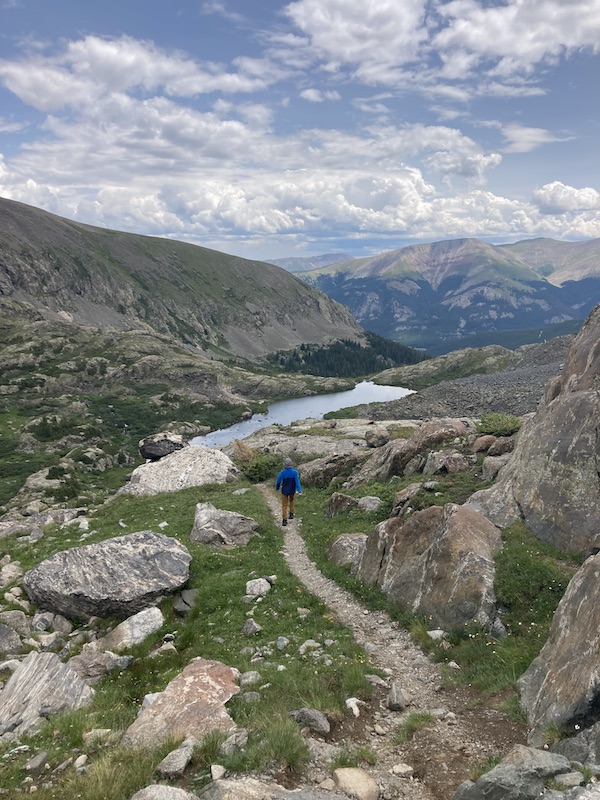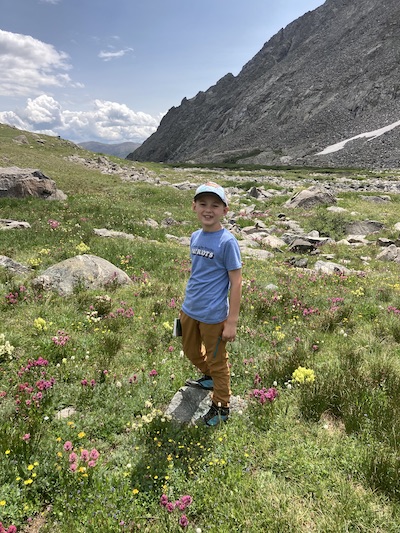

Sara Osborne is an Adjunct Instructor of Composition and Classical Education at the College of the Ozarks, a lifelong learner, and the mother of four curious children. She enjoys good books, travel, rich conversation and adventuring outdoors. Photographs by the author.

Naming of the natural world occurs from the very first pages of Christian Scripture: in Genesis 2, God creates adam, a generic name for mankind that would also serve as the proper name for the first male human. Just a few verses later, Adam himself is given the task of naming “all livestock and … the birds of the heavens and … every beast of the field” (Gen 2:20 ESV). Scripture is full of various instances of naming, whether it be naming a person or place or animal. While sometimes mysterious in its power, naming appears to bridge a gap between the human and divine, giving language to the relationship between co-creator and Creator, the natural and the supernatural.
In his book Landmarks, Robert Macfarlane writes that human beings “are and always have been name-callers, christeners.”(1) His book explores the powerful connection between naming and nature, and calls our attention to what may be lost when such language begins to die. Just as naming in Genesis 2 conveys meaning and signifies relationship, so does our terminology for engaging the natural world. Macfarlane suggests that this common language of nature possesses “a kind of word magic, the power that certain terms possess to enchant our relations with nature and place” (4).
Macfarlane’s justification for such an assertion is that naming leads to noticing. No litany of terms is required for encountering nature, but something different is gained when we approach the natural world with a language particular to its treasures. Macfarlane illustrates his point: “Smeuse is a Sussex dialect noun for ‘the gap in the base of a hedge made by the regular passage of a small animal’; now I know the word smeuse, I will notice these signs of creaturely movement more often” (5). Such noticing shapes our awareness of creatures, plants and place. In brief, nature words show us something we might otherwise fail to see.
Christian Scripture supports the connection between naming and knowledge: 1 Kings 4 tells us that “God gave Solomon wisdom and understanding beyond measure, and breadth of mind like the sand on the seashore, so that Solomon’s wisdom surpassed the wisdom of all the peoples of the east and all the wisdom of Egypt” (I Kgs 4:29–30 ESV). The text illustrates this wisdom by noting that “[Solomon] spoke of trees, from the cedar that is in Lebanon to the hyssop that grows out of the wall. He spoke also of beasts, and of birds, and of reptiles, and of fish” (I Kgs 4:33 ESV). Solomon appears to have been a skilled taxonomist, and the Bible associates his naming and noticing with wisdom.

Macfarlane argues that “[celebrating] the lexis of landscape is not nostalgic, but urgent” (10). American author and place-keeper Wendell Berry echoes this sentiment: “People exploit what they have merely concluded to be of value, but they defend what they love … and to defend what we love we need a particularizing language, for we love what we particularly know” (Cited in Landmarks, 10). Macfarlane notes this function of precise vocabulary as a criteria for the writers who help inform the pages of Landmarks: “… for all of them, to use language well is to use it particularly: precision of utterance as both a form of lyricism and a species of attention” (11).
It is this attention that appears most endangered. Macfarlane notes the concerning trend of children’s decreasing knowledge of nature terminology. One particular study revealed that “children aged eight and over were ‘substantially better’ at identifying Pokémon ‘species’ than ‘organisms such as oak trees or badgers.’”(2) The researchers “pointed to evidence linking ‘loss of knowledge about the natural world to growing isolation from it’.”(3) The resulting concern, of course, was that the children would fail to love or protect what they did not know – reminiscent of C. S. Lewis’s observation decades earlier that “men do not long continue to think what they have forgotten how to say.”(4)

Indeed, this trend in the young is concerning – but perhaps it is not only the young we should consider. I can vividly recall hikes full of eager questions from my own children – inquiring about the names of wildflowers, trees, birds and animals – to which I responded by pulling out my phone to conduct a quick internet search for the correct term. We are a bit better off when a grandparent is in tow, providing a compendium of nature terms far deeper than my own. This disparity is not owing to affinity: I am a self-avowed nature lover, much preferring a romp in the Rockies to a trip to Disney World, yet the deficit still exists. With each subsequent generation, safety concerns, pace of life, and concrete jungles of urban dwelling move us a little further away from wild places and the names that identify their bounty. While modern living has its benefits, we might be losing more than we know.
Macfarlane offers a frank assessment: “Language deficit leads to attention deficit. As we further deplete our ability to name, describe and figure particular aspects of our places, our competence for understanding and imagining relationship with non-human nature is correspondingly depleted” (Landmarks, 24). We can surely encounter nature without a sack full of names with which to label it, but the loss of names to promote noticing may indeed correspond with a loss of awareness and wonder.
This connection between naming, noticing and wonder is of paramount importance for the Christian. Without the language and experience of wild places, we lose some understanding of the potent proclamation of Psalm 19: “The heavens declare the glory of God, and the sky above proclaims his handiwork.” What part of this message is lost when one loses a vision of such skies? What wonder ceases when we no longer remember the starry hosts over which our Creator-God stands sovereign (Isa 40:26 ESV)? Our failure to notice the natural world cannot help but result in a failing awareness of both creation and creator. This inattentiveness not only impedes human flourishing, but also inhibits worship.

Just a few months ago, my husband and I took our boys on a week-long expedition into the Colorado Rockies. One particularly long and arduous hike took us through wooded forest, boulder fields, and high alpine lakes before it opened up onto an alpine meadow ablaze with summer colour. Eager to reach the trail’s end before an approaching thunderstorm, I forged across the meadow with zeal, aiming for a snack spot along the shoreline of a small stillwater. My youngest child dawdled – partly due to tired little-boy legs, partly due to the wildflower handbook he had insisted on toting along. He seemed to stop nearly every few strides, pausing to examine blossoms of colour and match them to his guidebook, proudly shouting out the corresponding term to anyone within earshot. I struggled to quell the temptation to hurry him along that welled up within me – until I turned around and took in the magnificent view that had been at our backs as we climbed. My heart could do nothing but shout “glory!” to the creator of such beauty. The landscape was awe-inspiring. And in a flashing moment, I realized that my small child was helping us learn and remember the words to ascribe worship to the God of it all. Well done, little one. May we all strive to learn and remember – so that we have the language to notice and wonder.

Get the latest issue in print or subscribe for the next three.